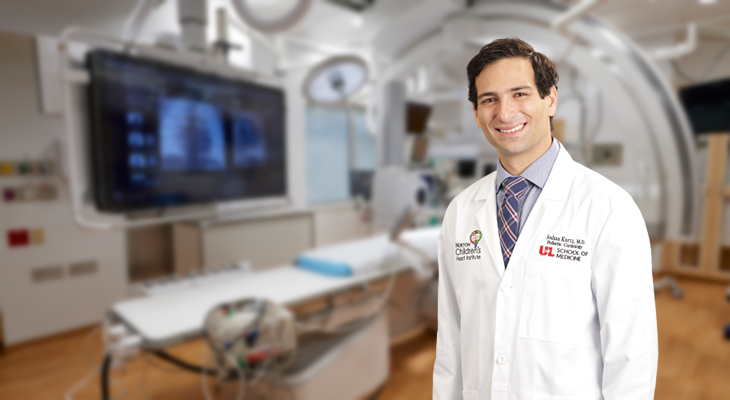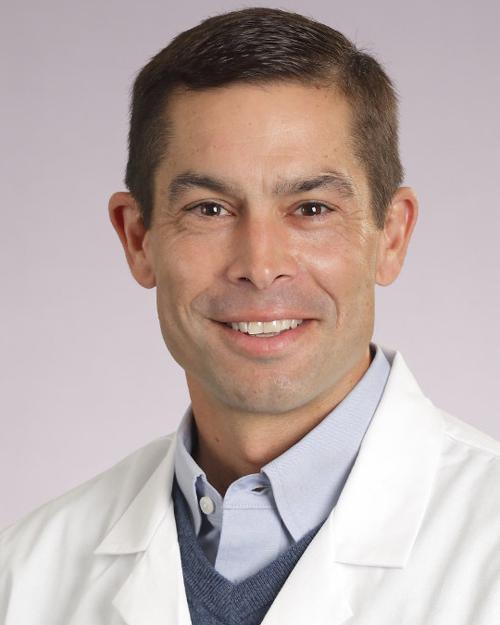Amplatzer Piccolo and Microvascular Plug now helping babies

Joshua Kurtz, M.D., and colleagues at Norton Children’s Heart Institute, affiliated with the UofL School of Medicine, are applying sophisticated training and experience to provide some of the newest minimally invasive treatments for babies born with congenital heart conditions.
“I want to help push the field forward and improve the future for children and adults with congenital heart disease,” said Dr. Kurtz, who also is involved in research to further advance the field.
Dr. Kurtz trained on the Amplatzer Piccolo Occluder device during his fellowship in interventional cardiology at Seattle Children’s Hospital in Washington. The device, recently approved by the Food and Drug Administration, is the first minimally invasive treatment for premature babies less than 2 kg with patent ductus arteriosus, or PDA.
With the placenta supplying oxygen in utero, the ductus arteriosus detours blood from going to the lungs. Those first cries and breaths normally trigger the ductus arteriosus vessel to close, but sometimes in premature babies or those at full term, it doesn’t and can lead to a number of medical problems.
The Amplatzer Piccolo Occluder provides an alternative to heart surgery to close a PDA. It’s a pea-sized device that is implanted and expanded to close the PDA. Tissue eventually grows around a mesh structure.
The Amplatzer Piccolo Occluder is just one piece of state-of-the-art equipment in the new Norton Children’s Heart Institute cardiac catheterization lab. Using the latest equipment means children undergoing treatment or diagnosis in the lab will receive less radiation, speedier and more accurate procedures, according to Dr. Kurtz.
In addition to PDA closures, Dr. Kurtz also performs pulmonary valve replacements, atrial septal defect closures and other procedures and diagnostic tests in the cardiac catheterization lab.
Dr. Kurtz and fellow interventional cardiologist Edward S. Kim, M.D., this year became some of the first cardiologists in the world to use a modified Medtronic Micro Vascular Plug to restrict excessive pulmonary artery blood flow — a consequence of several critical congenital heart conditions — in neonates.
Refer a patient
Use Norton EpicLink to quickly and easily refer a patient to Norton Children’s Heart Institute.
Advancing care for neonates with congenital heart anomalies
An assistant professor of pediatric cardiology at the University of Louisville School of Medicine, Dr. Kurtz also is involved in research looking at long-term liver complications for patients treated with the Fontan procedure.
A Fontan procedure is the third open heart surgery for children born with conditions such as hypoplastic left heart syndrome. Babies born with this condition have a smaller and weaker left side of the heart and cannot survive without surgery.
Originally from South Florida, Dr. Kurtz said he decided to become a doctor when a dynamic seventh-grade science teacher devoted a quarter to the HIV/AIDS epidemic and how researchers discovered the virus and disease. Dr. Kurtz decided then and there he wanted to become a doctor.
Dr. Kurtz went to medical school at the University of Buffalo, in New York, and then completed a pediatric cardiology fellowship at the Medical University of South Carolina in Charleston before completing the pediatric interventional cardiology fellowship at Seattle Children’s, where he was the senior fellow.
“I love taking care of kids because they are so resilient,” Dr. Kurtz said.

